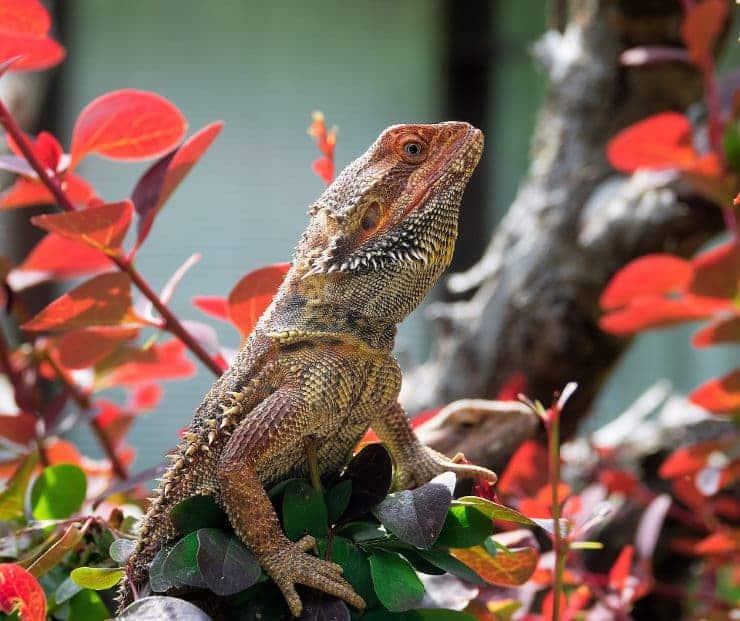Bearded dragons are fascinating reptiles known for their unique appearance and docile nature. As responsible pet owners, it's crucial to provide them with a balanced and nutritious diet to support their overall health and well-being. While insects make up a significant portion of their diet, incorporating vegetables is equally important.
In this article, we will explore the various vegetables that are safe and beneficial for bearded dragons, ensuring they receive a diverse and wholesome diet.




Photo Credit: Snap_it/Pixabay
The Importance of Vegetables in a Bearded Dragon's Diet
Bearded dragons are omnivorous creatures, and their diet in the wild consists of both insects and vegetation. Vegetables play a vital role in providing essential nutrients, vitamins, and minerals that contribute to their overall well-being. They also contribute to the overall dietary balance, helping prevent potential health issues like obesity and nutritional deficiencies.
Incorporating vegetables into your bearded dragon's diet offers several benefits:
Firstly, they provide dietary fibre, aiding in digestion and preventing constipation.
Secondly, vegetables are a source of hydration, helping to maintain proper hydration levels in your pet. Lastly, vegetables are rich in vitamins, such as vitamin A and vitamin C, which are crucial for your bearded dragon's immune system and overall growth.
Safe and Nutritious Vegetables for Bearded Dragons
When selecting vegetables for your bearded dragon, it is important to consider their nutritional value and safety. Not all vegetables are suitable for their consumption. Here are some safe and nutritious vegetables that can be included in their diet:
- Leafy Greens: Leafy greens should form the foundation of your bearded dragon's vegetable intake. Options such as collard greens, dandelion greens, kale, mustard greens, and turnip greens are excellent sources of calcium, vitamins A and K, and fibre. Remember to wash the greens thoroughly and provide them in bite-sized pieces to facilitate consumption.
- Squash and Zucchini: Yellow squash and zucchini are highly nutritious vegetables that are safe for bearded dragons. They offer hydration, fibre, and a good amount of vitamins A and C. These vegetables can be steamed or grated to make them easier to eat.
- Bell Peppers: Bell peppers, specifically red, yellow, and orange ones, are rich in antioxidants and vitamin C. They add variety to your bearded dragon's diet while providing essential nutrients. Chop them into small, manageable pieces and remove any seeds or stems.
- Carrots: Carrots are a great source of beta-carotene and fibre for bearded dragons. However, they should be offered in moderation due to their higher sugar content. Finely shred or grate the carrots to make them easier to digest.
- Butternut Squash: Butternut squash is a fantastic vegetable option for your bearded dragon. It is packed with vitamins A and C, as well as fibre. Steam or bake the squash and provide it in small, appropriately-sized portions.


Photo Credit: YamaBSM/Pixabay
Preparation and Feeding Guidelines
To ensure the safety and health of your bearded dragon, it is crucial to follow proper preparation and feeding guidelines:
- Always wash vegetables thoroughly to remove any pesticides or chemicals.
- Cut the vegetables into small, manageable pieces to avoid choking hazards.
- Offer a variety of vegetables to provide a diverse nutrient profile.
- Remove any uneaten vegetables after a few hours to prevent spoilage.
- Gradually introduce new vegetables to your bearded dragon's diet and observe their response.
Feeding Tips and Considerations
When it comes to feeding vegetables to your bearded dragon, there are a few additional tips and considerations to keep in mind:
- Organic and Pesticide-Free: Whenever possible, choose organic vegetables to minimize exposure to harmful pesticides. Pesticides can be toxic to your bearded dragon and may have adverse health effects.
- Proper Portions: Offer vegetables in appropriately sized portions that are easy for your bearded dragon to consume. Avoid large chunks that may be difficult for them to eat and increase the risk of choking.
- Variety is Key: Just like humans, bearded dragons benefit from a varied diet. Rotate the vegetables you offer to ensure your pet receives a wide range of nutrients and to prevent boredom.
- Calcium and Vitamin D3: Bearded dragons require calcium and vitamin D3 for proper bone development and overall health. Dusting vegetables with a reptile-specific calcium supplement can help meet these nutritional needs. Consult with a reptile veterinarian to determine the appropriate supplementation regimen for your pet.
- Monitor Eating Habits: Keep an eye on your bearded dragon's eating habits. If they consistently refuse certain vegetables or show signs of digestive issues, such as bloating or diarrhoea, consult with a reptile veterinarian for guidance.

Conclusion:
Incorporating vegetables into your bearded dragon's diet is essential for their overall health and well-being. By offering a variety of safe and nutritious options, you can ensure they receive the necessary vitamins, minerals, and fibre they need to thrive.
Remember to follow proper preparation and feeding guidelines, monitor their eating habits, and consult with a reptile veterinarian for personalized advice. With a balanced and varied diet, your scaly companion will enjoy a long, healthy, and happy life by your side.
Also View: How to Prevent Your Dogs from Eating Lizards
TO COMMENT ON AMP mobile pages, please switch to Non-AMP mobile version (link in the footer).